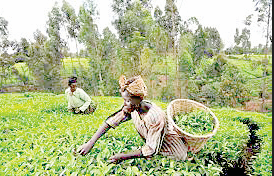Ensure improved earnings from tea are sustained

The bud and its two guards, the two leaves, have sustained hundreds of thousands of households for decades.
From the highlands of the Rift Valley to the slopes of Mt Kenya and the fertile swathes of Kisii, tea bushes have fought many battles including attempts to uproot them, to continue making a beautiful canopy that reflects the importance of the crop to millions of livelihoods.
Growing up in Konoin, Bomet County, plucking tea was not an interesting chore. Many days we would wake up early to pluck tea in biting cold emanating from the Mau forest. But it was a duty that had to be done for it was a source of income for us and many families.
Years later, it is still the same duty many households have to honour every day.
It is heartwarming, therefore, to see the fortunes in the sector looking up again after many years of haunting returns, thanks to the impact of interventions being implemented by the government.
Farmers supplying tea to KTDA factories received improved monthly pay this month, which is notable because some privately-owned competitors cut their pay towards the end of last year. The higher pay is on top of one of the highest bonuses last year.
Better pay and friendly policies have inspired farmers who are now producing more because of the motivation from improved returns and such incentives like the availability of cheaper fertilizer.
The daunting challenge now is how to sustain the high productivity for long-lasting gains to farmers.
Interventions in the sub-sector have perfectly merged to sweeten the tea.
The implementation of the new Tea Act sponsored by Kericho Senator Aaron Cheruiyot in 2020 tops the decisions that have injected needed impetus in the push to overhaul the legislative infrastructure for better returns.
Although some sections have been suspended by the High Court, a good chunk of the Act is active and it is upon actors to implement them for maximum benefit to farmers.
For instance, prompt payment of farmers for the produce delivered to the tea factories has seen them meet their financial obligations. Nowadays, farmers are paid within the month of the delivery of the leaves, a remarkable improvement from the days they had to wait forever.
The digitization of the collection of leaves has also seen the use of better weighing scales helping to root out crafty clerks who often employed dirty tricks to chop off kilos from farmers. Working in cahoots with unscrupulous people in the value chain, they assigned themselves thousands of kilos worth millions of shillings without breaking a sweat.
It is worth noting that Deputy President Rigathi Gachagua has in the last one year shown leadership and firmness in implementation of critical parts of the Act for long-term growth and increased benefits to farmers.
Since the Tea Conference held in Kericho last July which was chaired by the Deputy President, the nuts have fitted in the bolts and it is clear the sub-sector is reclaiming its allure.
From the pronouncements he has made since he was tasked by President William Ruto to spearhead implementation of reforms in the sector, the DP is unequivocal that farmers must get their rightful share.
There are still lingering issues that need to be addressed for farmers to reap better benefits from tea. For instance, it is sad that farmers still have to brave cold nights guarding their tea leaves at buying centres as they wait for KTDA trucks.
With the conducive environment provided by the government, it is upon all actors in the tea value-chain to exploit this goodwill to refine laws and policies and develop more to make the sector beneficial to farmers.
— The writer is a communications specialist —[email protected]



